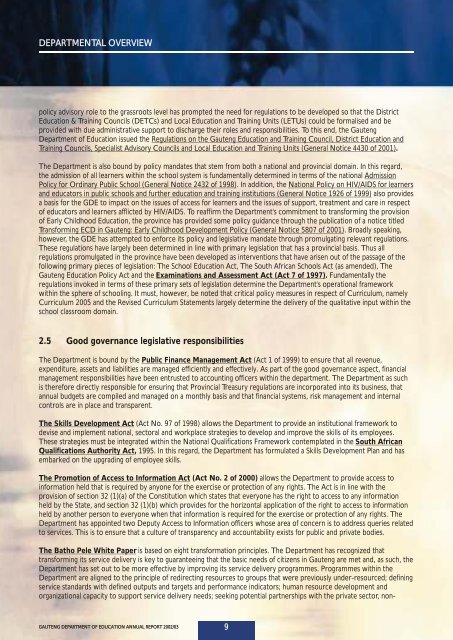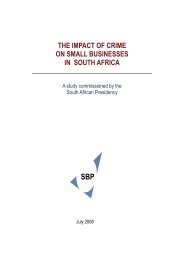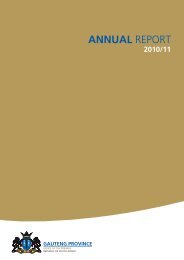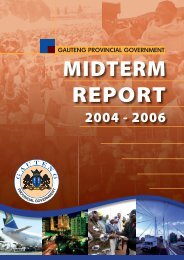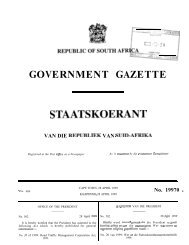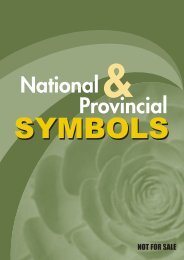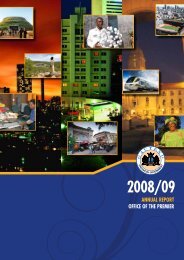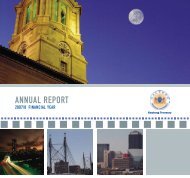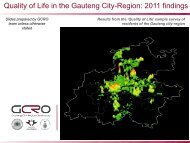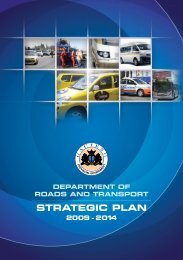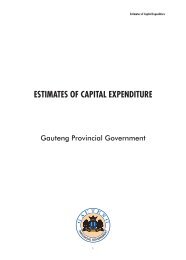Education Annual Report 2002-2003 - Gauteng Online
Education Annual Report 2002-2003 - Gauteng Online
Education Annual Report 2002-2003 - Gauteng Online
Create successful ePaper yourself
Turn your PDF publications into a flip-book with our unique Google optimized e-Paper software.
DEPARTMENTAL OVERVIEWpolicy advisory role to the grassroots level has prompted the need for regulations to be developed so that the District<strong>Education</strong> & Training Councils (DETCs) and Local <strong>Education</strong> and Training Units (LETUs) could be formalised and beprovided with due administrative support to discharge their roles and responsibilities. To this end, the <strong>Gauteng</strong>Department of <strong>Education</strong> issued the Regulations on the <strong>Gauteng</strong> <strong>Education</strong> and Training Council, District <strong>Education</strong> andTraining Councils, Specialist Advisory Councils and Local <strong>Education</strong> and Training Units (General Notice 4430 of 2001).The Department is also bound by policy mandates that stem from both a national and provincial domain. In this regard,the admission of all learners within the school system is fundamentally determined in terms of the national AdmissionPolicy for Ordinary Public School (General Notice 2432 of 1998). In addition, the National Policy on HIV/AIDS for learnersand educators in public schools and further education and training institutions (General Notice 1926 of 1999) also providesa basis for the GDE to impact on the issues of access for learners and the issues of support, treatment and care in respectof educators and learners afflicted by HIV/AIDS. To reaffirm the Department's commitment to transforming the provisionof Early Childhood <strong>Education</strong>, the province has provided some policy guidance through the publication of a notice titledTransforming ECD in <strong>Gauteng</strong>: Early Childhood Development Policy (General Notice 5807 of 2001). Broadly speaking,however, the GDE has attempted to enforce its policy and legislative mandate through promulgating relevant regulations.These regulations have largely been determined in line with primary legislation that has a provincial basis. Thus allregulations promulgated in the province have been developed as interventions that have arisen out of the passage of thefollowing primary pieces of legislation: The School <strong>Education</strong> Act, The South African Schools Act (as amended), The<strong>Gauteng</strong> <strong>Education</strong> Policy Act and the Examinations and Assessment Act (Act 7 of 1997). Fundamentally theregulations invoked in terms of these primary sets of legislation determine the Department's operational frameworkwithin the sphere of schooling. It must, however, be noted that critical policy measures in respect of Curriculum, namelyCurriculum 2005 and the Revised Curriculum Statements largely determine the delivery of the qualitative input within theschool classroom domain.2.5 Good governance legislative responsibilitiesThe Department is bound by the Public Finance Management Act (Act 1 of 1999) to ensure that all revenue,expenditure, assets and liabilities are managed efficiently and effectively. As part of the good governance aspect, financialmanagement responsibilities have been entrusted to accounting officers within the department. The Department as suchis therefore directly responsible for ensuring that Provincial Treasury regulations are incorporated into its business, thatannual budgets are compiled and managed on a monthly basis and that financial systems, risk management and internalcontrols are in place and transparent.The Skills Development Act (Act No. 97 of 1998) allows the Department to provide an institutional framework todevise and implement national, sectoral and workplace strategies to develop and improve the skills of its employees.These strategies must be integrated within the National Qualifications Framework contemplated in the South AfricanQualifications Authority Act, 1995. In this regard, the Department has formulated a Skills Development Plan and hasembarked on the upgrading of employee skills.The Promotion of Access to Information Act (Act No. 2 of 2000) allows the Department to provide access toinformation held that is required by anyone for the exercise or protection of any rights. The Act is in line with theprovision of section 32 (1)(a) of the Constitution which states that everyone has the right to access to any informationheld by the State, and section 32 (1)(b) which provides for the horizontal application of the right to access to informationheld by another person to everyone when that information is required for the exercise or protection of any rights. TheDepartment has appointed two Deputy Access to Information officers whose area of concern is to address queries relatedto services. This is to ensure that a culture of transparency and accountability exists for public and private bodies.The Batho Pele White Paper is based on eight transformation principles. The Department has recognized thattransforming its service delivery is key to guaranteeing that the basic needs of citizens in <strong>Gauteng</strong> are met and, as such, theDepartment has set out to be more effective by improving its service delivery programmes. Programmes within theDepartment are aligned to the principle of redirecting resources to groups that were previously under-resourced; definingservice standards with defined outputs and targets and performance indicators; human resource development andorganizational capacity to support service delivery needs; seeking potential partnerships with the private sector, non-GAUTENG DEPARTMENT OF EDUCATION ANNUAL REPORT <strong>2002</strong>/039


